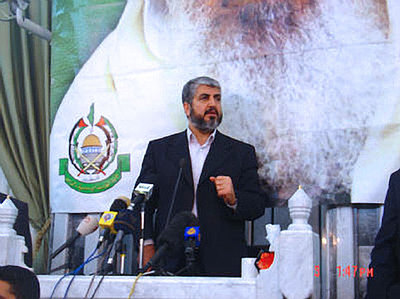
Amjad Atallah directs the New America Foundation/Middle East Task Force.
The Wall Street Journal reported on Friday that Hamas Chief Khaled Meshaal told Jay Solomon and Julien Barnes-Dacey in an interview that “We along with other Palestinian factions in consensus agreed upon accepting a Palestinian state on the 1967 lines. This is the national program. This is our program. This is a position we stand by and respect.” Meshaal also insisted that Hamas would commit to an immediate reciprocal cease-fire with Israel and a prisoner swap.
Anti-Hamas activists will note that he also insisted that he would accept and respect a Palestinian state based on 1967 borders “as part of a broader peace agreement with Israel” if Israel accepted the right of return for millions of Palestinian refugees and the establishment of a capital for the Palestinian state in East Jerusalem.
But what is fascinating is that Meshaal has in fact, parroted the official negotiating position of the PLO and of Fatah. Even though a number of PLO leaders have privately admitted to Israelis that they might forgo the right of return in exchange for the 1967 borders, this has never been the official negotiating position and even President Mahmoud Abbas has publicly stuck to the line that there needs to be a “just and agreed” resolution of the refugee issue. On East Jerusalem, there is no daylight between the Hamas and PLO position.
Most importantly, Meshaal seems to be indicating that Hamas now endorses the US attempt to negotiate an end to the occupation.
In the past, Hamas’ position has been that that they would allow President Abbas, as leader of the PLO, to negotiate while they remained the pious opposition, undoubtedly back-biting his attempts to conclude an agreement and presenting the results as a sell-out. It was politics at its most cynical. But in Friday’s WSJ piece, Meshaal is quoted saying “Hamas and other Palestinian groups are ready to cooperate with any American, international or regional effort to find a just solution to the Arab-Israeli conflict, to end the Israeli occupation and to grant the Palestinian people their right of self-determination.”
If Meshaal is truly speaking on behalf of all of Hamas (and Hamas is much better at speaking with a unified voice than most Palestinian parties), then he is actually endorsing President Obama’s efforts to quickly negotiate an end to the conflict and is offering Hamas “cooperation” in that regard.
A few months ago, I was in Israel and the Occupied Territory. Many of the Israeli officials with whom I met insisted that the Palestinian leadership in Ramallah wanted them to continue the siege on the civilians in Gaza in order to maintain pressure on Hamas. But in meetings with members of Salaam Fayyad’s new cabinet, including Fatah members, they were adamant that this wasn’t true.
Speaking on behalf of the Prime Minister, Minister of National Economy Bassem Khoury insisted that the best way to promote peace and the legitimacy of their government was to flood the Gaza Strip with commercial goods, food, and reconstruction equipment. Minister of Public Works Mohamed Shtayyeh, a prominent Fatah leader, agreed and noted that the best and only way to compete with Hamas was in the realm of politics. He had been and remained confident that Fatah could more than hold its own against Hamas if the United States was serious about negotiating an end to the occupation. (You can see an interview my colleague Steve Clemons did with him some months ago here.) Fatah is scheduled to host its Sixth Congress next week which will elect a new generation of leaders (and undoubtedly reaffirm some of the old generation). This may only strengthen their self-confidence.
It seems the divide among Palestinians is evolving. It may end up not being between Hamas and Fatah – both of whom are now on record supporting President Obama’s efforts to negotiate an end to the occupation with the common negotiating stance that “justice” needs to be ensured for the refugees and East Jerusalem must become the Palestinian capital. The divide may be between those in Palestinian society who trust the democratic process to ensure the best Palestinian leaders rise to positions of authority and those who remain unconvinced of their own skills or their party’s.
This is an excellent time for the United States government to begin finding ways to cement this progress (and maybe to quietly thank all those European and American statesmen who played a role in getting us this far) and to leverage it into the upcoming negotiations.
— Amjad Atallah


78 comments on “Guest Post by Amjad Atallah: Hamas Again Accepts a Palestinian State on the 1967 Lines”